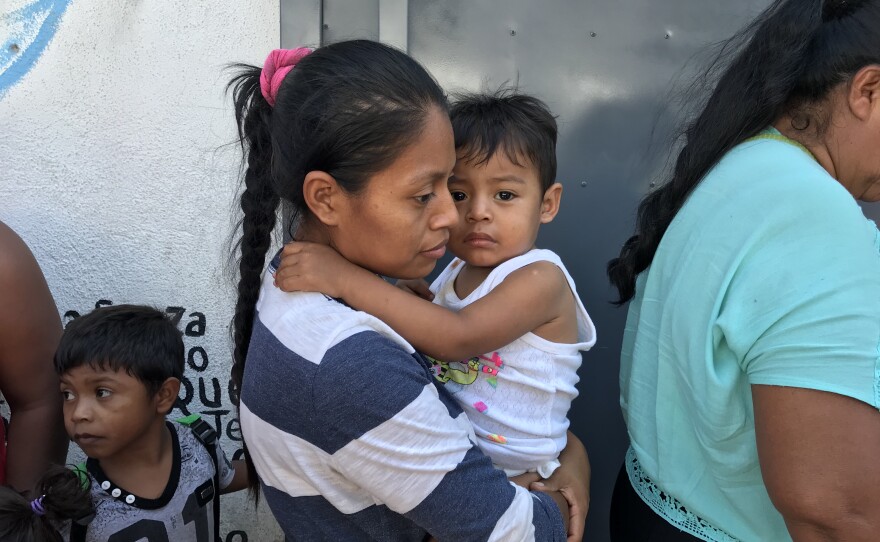For years, the U.S. has enlisted Mexico's help to keep Central Americans from reaching the U.S. through programs like the Merida Initiative, which provides money and training to Mexican immigration officials on Mexico's southern border.
Now, some of the outsourced immigration enforcement is happening at the San Ysidro Port of Entry, with Mexican immigration officials helping filter asylum-seekers through when the port is at capacity.
A few human rights lawyers and groups say this collaboration is problematic because some asylum-seekers may not be safe in Mexico. They may be fleeing criminal organizations with networks in Mexico or the Mexican government itself.
"You're putting people's lives at risk," said attorney Nicole Ramos. "Some people are literally being chased to the ports of entry."
Asking asylum-seekers to stay in Mexico or work with Mexican officials while they wait for the U.S. to resolve its port capacity issues fails to acknowledge the range of dangers they face, she said.
The San Ysidro Port of Entry has space to detain about 300 people at a time, according to U.S. officials. When it reaches capacity, asylum-seekers must wait in Mexico. Mexican immigration officials will then work to file them through the port as space becomes available, sometimes through an unofficial ticketing system.
"Both of these countries are collaborating to violate international law and to help the U.S. evade its obligations under its own federal law and it's just simply not acceptable," Ramos said.
The U.S. Immigration And Nationality Act guarantees people fleeing persecution the right to apply for asylum. People fleeing persecution are also protected under a U.N. treaty, which states that countries can't turn away people who fear for their lives.
KPBS reached out to U.S. Customs and Border Protection, the Department of Homeland Security and other agencies about this collaboration on the processing of asylum-seekers; they all either declined to comment or did not respond.
But last month, when a caravan of asylum-seekers approached the San Ysidro Port of Entry, Mexico’s top immigration official for Baja California, Rodulfo Figueroa, stopped the group in its tracks, saying they couldn’t all go into the U.S. at once.
Alex Mensing, program coordinator for the caravan-organizing group Pueblo Sin Fronteras, asked Figueroa how many people could approach the port of entry. Figueroa said he wasn't the one who didn't want them entering all at once — it was the U.S.
“The problem is not me, it’s the North American authorities," Figueroa said.
Earlier in the afternoon, Customs and Border Protection had announced that the port of entry was at capacity. When asked why he was conveying the message from the U.S., Figueroa declined to comment except to say that he wasn't acting on orders from the U.S.
Flashback to yesterday’s caravan: Mexico’s top immigration official for Baja California Rodulfo Figueroa (INAMI) tells caravan organizers that the asylum seekers can’t all enter the U.S. at once. Neither country will confirm official collaboration on asylum seekers. @KPBSnews pic.twitter.com/6s8kVL6mRE
— Jean Guerrero (@jeanguerre) April 30, 2018
This was the caravan that President Trump had singled out in recent tweets and speeches, saying it was full of people who intended to enter the U.S. illegally.
Within days of the caravan's arrival, Attorney General Jeff Sessions announced that the U.S. would be prosecuting 100 percent of illegal border crossings, including those of asylum-seekers.
RELATED: Sessions Says ‘Zero Tolerance’ Policy For Border Crossers May Split Families
A court filing in the prosecution of one of these people — a Central American woman who illegally entered the U.S. after participating in the caravan, according to the Department of Justice — indicates some level of collaboration on this issue.
Assistant chief agent for San Diego's Border Patrol sector Ryan Yamasaki stated in the declaration that "Border Patrol's San Diego sector determined that we would seek criminal charges against those individuals who were identified as caravan participants — either through their admissions or a list provided by Mexican immigration officials — who entered or attempted to enter the United States illegally."






